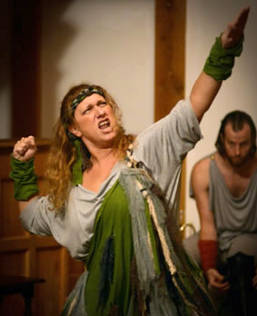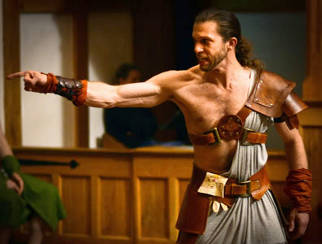Summary 
A talented ensemble enlivens one of the slightest and least entertaining scripts in the canon via strong acting, a wicked sense of humor, and generous amounts of contemporary songs sung and played live onstage. A plethora of characters and plot lines with focus on the doomed romance and an unrelentingly bleak conclusion.
Design
Directed by Jim Warren. Costume design by Victoria Depew. Fight direction by Jeremy L. West.
Cast
Chris Johnston (Hector/Calchas), Dylan Paul (Paris/Nestor), Gregory Jon Phelps (Troilus), Rene Thornton, Jr. (Margareton/Ulysses), Allison Glenzer (Cassandra/Thersites), Emily Brown (Andromache/Patroclus), Tim Sailer (Aeneas), Lee Fitzpatrick (Cressida), John Harrell (Pandarus/Ajax), Tracie Thomason (Alexander/Helen/Diomedes), John Innerst (Agamemnon), Benjamin Curns (Achilles).
Analysis
Jim Warren, the artistic director for American Shakespeare Center (ASC), directs the final preview performance of a short run - closing in November - of Troilus and Cressida at the Blackfriars Playhouse. A talented ensemble of twelve - also performing Romeo and Juliet, All's Well That Ends Well, and two other plays in rotating repertory - begins the performance with a half hour of live music, playing contemporary songs that have at least some relevance to the play to be performed. For the most part, the music is performed from the musicians' box in the balcony above the stage, an unseen drummer deep upstage, and the first songs include guitars and harmonica as well as keyboards, a cello, and an accordion. The troupe plays a jazzy version of Iron Maiden's "The Trooper," a fast-paced heavy metal electric-guitar stomper - "the bugle sounds, the charge begins, but on this battlefield no one wins" - to which they add three big brassy horns to a slowed but recognizable melody. They follow, quite appropriately for Troilus and Cressida, with Carly Simon's "You're So Vain" - "you probably think this song is about you" - which draws some titters from the still-arriving audience, then a bluesy New Orleans-style original tune that ends with a catchy refrain - "take me up!" - and Benjamin Curns' big-eyed jazz-hands finish. The set concludes with a cover of Taylor Swift's mega-popular "I Knew You Were Trouble" - "I think the worst part of it all wasn't losing him, it was losing me" - and finally John Cafferty's "On the Dark Side," a Springsteen-sounding rocker with a reference to male behavior - "from out of the shadows she walks like a dream, makes me feel crazy, makes me feel mean" - akin to the furious fight over the face that launched a thousand ships.

A pre-curtain introduction to ASC's performance style - interaction with the audience, universal lighting, minimal scenic design - is executed by cast members in character, John Innerst as "the great and mighty Agamemnon" asking for - and getting - enthusiastic cheers from the crowd, and Tim Sailer's Aeneas requesting a truce so they can attend to "this pre-show business." The production is a "throwback" to the style of the company's earlier days, which featured all cast members onstage or in the audience throughout the performance, observing, changing costumes, or even playing an instrument like a trumpet. Warren's cast interacts with the audience throughout the performance, sometimes with the front rows but more often with patrons seated onstage in Gallants' Stools - six per side - or in the Lords' Chairs within railinged booths, also on either side of the performance space. Curns' Chorus refers to the audience members in the Gallants' Stools as "fair beholders" in his Prologue, Allison Glenzer's Cassandra steals two of their seat cushions 3.1 so Paris and Helen can sit comfortably while canoodling, and Rene Thornton, Jr.'s hyper-politician Ulysses shakes hands 3.3 on one side of the stage, gets a big hug on the opposite side, and would kiss a baby if given the opportunity. Glenzer also plays the sardonic observer Thersites, sporting black Converse high-top sneakers of all things, and she works the room, delighted at the immediate shouts of response she gets at 2.3 - "can I get an 'amen?'" - in discussing the "over proud and under honest" combatants, and in 3.3 she mimics the brute Ajax, kissing her biceps and stomping offstage like an enormous sumo wrestler, pushing her way into a front-row bench to observe. The title lovers also take part, the diminutive curly-red-haired Cressida gesturing balefully 1.1 at the meager choices of non-soldier men within the audience - "drunk, sick, or have no legs" - and Gregory Jon Phelps' pony-tailed Troilus sprints through the parade of combatants like a star quarterback at the homecoming game, applauding rapidly for himself and pointing at audience members who join him in clapping. By 5.2, however, Phelps' Troilus is a changed man, and he seethes in a Lords' Chair behind the wooden railing, accompanied by Ulysses, watching the lovely blonde Diomedes kiss Cressida and take his wrist band favor from her. And in 5.3, he shreds Pandarus' letter downstage and flings the torn papers into the front rows of the audience.
Warren color codes the countries for easy frame of reference, the Greeks all wearing green tunics and robes, the Trojans attired in rust-red, everyone wearing a gray cotton base with sandals. There are moments of humor, like Diomedes describing Ajax 1.2 as "valiant as the lion, churlish as the bear, slow as the elephant," or the black-armored and bearded Hector startled during the parade of combatants when Cressida and Pandarus squeal and shout his name from the rear of the theatre, waving garments like starry-eyed groupies. But the somewhat slight core story is the slew of characters caught up in a meaningless war, from Glenzer's crazy Cassandra barefoot and bawling 2.1, and Curns' lethargic Achilles with his female plaything Patroclus 2.3, to the puffed up Ajax strutting 2.3 and bear-hugging Achilles.

Act 3 revolves around John Harrell's effeminate Pandarus, first singing a love song - "love, love, nothing but love" - with a comical pair of back-up singers crooning behind him ("oh! oh!") as Paris and Helen make out while lying together downstage, their passion increasing until their groping and groaning seems about to become pornographic. Harrell's Pandarus delivers a wry, "is this the generation of love?" before turning to the far more wholesome Cressida and Troilus 3.2. They are initially reluctant, the veiled Cressida rushing upstage to the curtain then giggling, Phelps' shirtless Troilus initially thrilled - "I am giddy!" - then reticent and aloof, his arms crossed over his chest. Harrell's Pandarus must show them an affectionate couple seated in the Lords' Chairs to give them an example how to behave, and when they finally kiss and kiss again, he shouts his encouragement - "seal it! seal it!" - as Warren pauses for intermission.
No true break for the performers, the intermission begins immediately with more music played from the Musicians' Box above the stage - dancing pairs of back-up singers in the smaller boxes on each side - as Glenzer patrols the stage, hawking raffle tickets and encouraging concession sales. First is a cool stomp-and-clap rhythm that segues into "Separate Ways" by Journey - "true love won't desert you" - featuring a big horn solo, then a cover of The Four Seasons' "Stay": "oh, won't you stay just a little bit longer." Their final song is perhaps their best, The Beatles' "We Can Work It Out" sung with a spirited audience clap along - "life is very short and there's no time for fussing and fighting, my friend" - and then such an energetic mouth-organ solo conclusion that the bemused musician - Dylan Paul - is left gasping for breath, while also the recipient of loudly appreciative applause.
The romantic 4.2 certainly recalls Romeo and Juliet, with the two lovers gently disagreeing over the meaning of the song of the lark. Harrell's Pandarus injects some humor, peering into the bedchamber to shout, "how go maidenheads?" then when they know they must be parted and hold each other with passion: "let me embrace, too!" But as soon as 4.5 Cressida has passed into the hands of the Greeks, moving from Diomedes then from soldier to soldier, before Curns' lusty Achilles bends her over passionately and she cries out. The Act 5 fight sequences are highlighted by the spirited parlay between Hector and Ajax, who fight to a 5.1 draw, then between Hector and Achilles - "where should I kill Hector?" - before Cassandra and Hector's wife both beg on their knees 5.3 to try to prevent him from going to battle.
Lee Fitzpatrick's Cressida marks the beginning of the end, her defeat abject, and she settles into an upstage chair to hang her head and forlornly pound out a drumbeat rhythm for the warfare that continues throughout the rest of the play. Warren provides a succession of images - Thersites sprawls as if killed 5.4 and lets herself fall right off the edge of the stage; Aeneas drags the felled Patroclus from the stage by one arm; Phelps' enraged Troilus fights Ajax and Diomedes at the same time 5.6; Curns' Achilles dispatches Hector with a particularly brutal twisting of the sword 5.8 - ending with Nestor's 5.9 call for the silencing of the drums. The ending is relentlessly downbeat, Cressida gone forever and Troilus railing in seeking vengeance for Hector against Achilles - "I'll hunt thee like a wicked conscience!" - and finally Harrell's Pandarus, bitterly speaking 5.10 of "broken lechery" and bequeathing venereal disease to the audience.